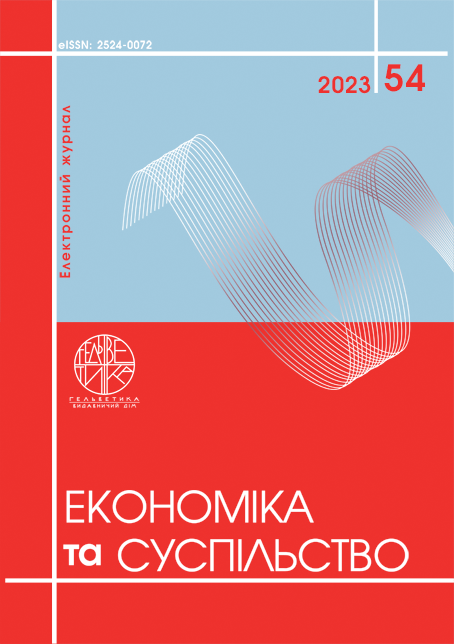VARIETIES OF ARTIFICIAL INTELLIGENCE AND OPPORTUNITIES AND PROBLEMS OF ITS USE IN STRATEGIC PLANNING IN THE ECONOMY
Abstract
The purpose of this article is to identify problems and develop proposals for increasing the effectiveness of strategic planning by involving artificial intelligence. The popularization of new technologies has led to an increase in the demand for artificial intelligence (AI) technology. During the period of the COVID-19 quarantine, artificial intelligence began to be actively adapted and used in the field of entertainment and education. New technologies are designed to increase human efficiency and reduce energy and time spent on tasks. Artificial intelligence can quickly process an array of data and provide analysis of the processed information, saving human effort and time. In the economy, making any decision requires an initial analysis of an array of data to build balanced actions and economically profitable decisions. When making strategic decisions or building a company's strategy in general, the amount of information that a specialist needs to research can be immense for one or several people or take a lot of time to research. The possibilities of artificial intelligence can help a specialist to reduce the time spent on researching a set of data and improve the quality of his work. In the paper, proposals were made regarding the use of artificial intelligence systems in the economy. The classification of artificial intelligence is presented. The possibilities and problems of using different types of artificial intelligence in the economy as a whole and in the field of strategic planning are analyzed. The article substantiates the conditions under which the use of artificial intelligence in strategic planning is appropriate. The work investigated the trends in the development of artificial intelligence. A table with examples of existing artificial intelligences according to categories has been created. A list of existing artificial intelligences that can be used in the activities of farms is proposed. The practical value of the work consists in getting acquainted with the possibilities of using artificial intelligence in strategic planning and in providing recommendations on the use of different types of artificial intelligence in the strategic management of the enterprise.
References
Офіційний сайт ТОВ «МЕТІНВЕСТ ДІДЖИТАЛ». URL: https://metinvest.digital/ua
Від Ш до І: що таке штучний інтелект та як він трансформує світ. URL: https://speka.media/ai/
Як діє штучний інтелект і перспективи його використання. Матеріали конференції «AI conference». URL: https://aiconference.com.ua
Офіційний сайт ПП "ЛАНТЕК". URL: https://ula.lantec.ua
Смерічевський С.Ф., Ареф’єва О.В., Пілецька С.Т. Формування стратегічних рішень при управлінні змінами на підприємстві. Бізнес Інформ. 2022. № 6. C. 108–117. URL: https://doi.org/10.32983/2222-4459-2022-6-108-117.
Korytko T. et al. Strategy of Innovative Development of an Enterprise on the Basis of Evaluation of its Intellectual Capital / Korytko T., Bryl I., Piletska S., Arefieva O., Arefiev S. Naukovyi Visnyk Natsionalnoho Hirnychoho Universytetu. 2021. No. 3. P. 134–137. DOI: https://doi.org/10.33271/nvngu/2021-3/134 10.
Андрощук Г.О. Штучний інтелект: економіка, інтелектуальна власність, загрози. Теорія і практика інтелектуальної власності. 2021. № 2 (2021). С. 56-74. DOI: https://doi.org/10.33731/22021.236555
Kwilinski A., Kuzior A. Cognitive Technologies in the Management and Formation of Directions of the Priority Development of Industrial Enterprises. Management Systems in Production Engineering. 2020. Vol. 28. Iss. 2. P. 133–138. DOI: https://doi.org/10.2478/mspe-2020-0020
Андрощук Г.О. Винаходи штучного інтелекту. Інтелектуальна власність в Україні. 2020. № 11. С. 67.
Пілецька С.Т., Храпач В.О. Диверсифікація як метод підвищення економічної ефективності підприємства в післявоєнний період. Економіка та суспільство. 2023. Випуск № 48. DOI: https://doi.org/10.32782/2524-0072/2023-48-23
Official website of Metinvest Digital PJSC. Access mode: https://metinvest.digital/ua
From Z to I: what is artificial intelligence and how it transforms the world URL: https://speka.media/ai/
How artificial intelligence works and prospects for its use. Materials of the conference "AI conference". URL: https://aiconference.com.ua
Official website of PE "LANTEC" URL: https://ula.lantec.ua
Smerichevskyi, Serhii F., Arefieva, Olena V., and Piletska, Samira T. (2022) “Formation of Strategic Decisions in the Management of Changes in the Enterprise.” Business Inform № 6:108–117. DOI: https://doi.org/10.32983/2222-4459-2022-6-108-117
Korytko T., Bryl I., Piletska S., Arefieva O., Arefiev S. (2021) Strategy of Innovative Development of an Enterprise on the Basis of Evaluation of its Intellectual Capital. Naukovyi Visnyk Natsionalnoho Hirnychoho Universytetu. 2No. 3. P. 134–137. DOI: https://doi.org/10.33271/nvngu/2021-3/13410
Androschuk G.O. (2021) Artificial intelligence: economy, intellectual property, threats. Theory and practice of intellectual property. No. 2 (2021). P. 56-74. DOI: https://doi.org/10.33731/22021.236555
Kwilinski A., Kuzior A. (2020) Cognitive Technologies in the Management and Formation of Directions of the Priority Development of Industrial Enterprises. Management Systems in Production Engineering. Vol. 28. Iss. 2. P. 133–138. DOI: https://doi.org/10.2478/mspe-2020-0020
Androschuk G.O. (2020) Inventions of artificial intelligence. Intellectual property in Ukraine. No. 11. P. 67.
Piletska S.T., Khrapach V.O. (2023) Diversification as a method of increasing the economic efficiency of the enterprise in the post-war period. Economy and society. Issue 48. DOI: https://doi.org/10.32782/2524-0072/2023-48-23

This work is licensed under a Creative Commons Attribution 4.0 International License.


